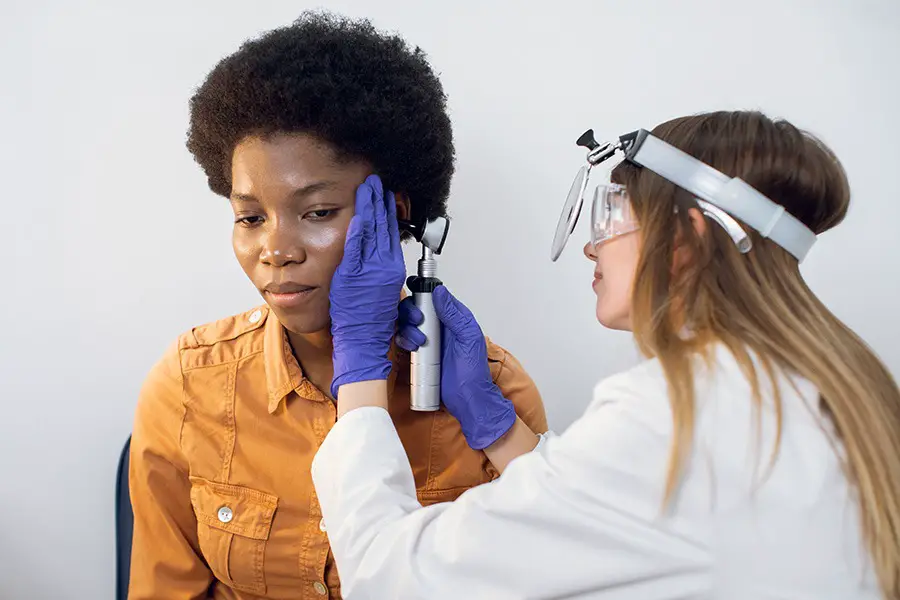Introduction
A severe infection with potentially lasting impacts on health, meningitis also has significant implications on an individual’s hearing. In this detailed analysis, we intend to demystify the correlation between meningitis and hearing loss. Our exploration will cover the various types of meningitis and their respective implications on hearing, alongside offering preventive measures and care strategies. Moreover, we shall emphasize the necessity of early identification and intervention, and discuss the hurdles faced by those dealing with hearing loss due to meningitis.
Understanding the Impact of Meningitis Strains on Hearing Loss
The severity of hearing loss associated with meningitis can vary depending upon the strain of the infection. Bacterial meningitis, being the most serious type, is predominantly responsible for meningitis-associated hearing loss. Mainly, Streptococcus pneumoniae, Neisseria meningitidis, and Haemophilus influenzae type b bacteria trigger inflammation within the inner ear, leading to damage to the fine hair cells that are crucial for carrying sound signals to the brain.
In contrast, viral meningitis rarely causes permanent hearing loss, although it can induce temporary hearing issues. Comprehending these distinctions between various meningitis strains can guide in formulating the right treatment and prevention approach, ultimately reducing the risk of hearing impairment.
The Overlooked Aftermath: Hearing Loss Post-Meningitis
Hearing loss is a frequent yet underestimated aftermath of meningitis. Nearly one-third of bacterial meningitis survivors might undergo a certain degree of hearing impairment, which can range from mild to severe. This impairment occurs when the inflammation in the inner ear induced by the infection damages the hair cells that transmit sound signals to the brain.
If not identified and treated in a timely manner, the hearing loss due to meningitis can have lifelong implications, such as issues with language and speech development, social isolation, and a reduced quality of life. Therefore, it’s vital for meningitis survivors and their families to monitor their hearing and seek appropriate treatment and assistance if any hearing loss is detected.
Meningitis and Hearing Loss in Infants: Safeguarding and Care
Infants are especially susceptible to meningitis and the consequent hearing loss. If your infant is showing symptoms like irritability, lethargy, and a bulging fontanelle (soft spot on the head), they might be suffering from meningitis, necessitating immediate medical attention. Detecting and treating the disease early on is crucial to decrease the risk of hearing loss and other complications.
Safeguarding infants against meningitis is imperative for their hearing health. Be sure that your child receives all the recommended vaccinations, as these vaccines can prevent many bacterial and viral strains that cause meningitis. Regular hearing screenings and check-ups with an audiologist can help detect any hearing issues and provide early intervention if necessary.
Meningitis and Sudden Hearing Loss: Critical Information
Experiencing sudden hearing loss can be daunting, and in certain instances, meningitis might be the root cause. Meningitis-induced sudden hearing loss can affect either one or both ears and might happen all at once or gradually worsen over a few days. The hearing loss could be temporary or permanent, depending on the severity of the infection and how effective the treatment is.
In case you or a loved one encounters sudden hearing loss, it’s important to seek medical attention immediately. Early diagnosis and treatment of meningitis can significantly enhance the chances of preserving your hearing and avoiding further complications.
Safeguarding Your Hearing During Recovery from Meningitis
The first step is to ensure prompt and appropriate treatment of the infection because early intervention can mitigate complications like hearing loss. Adhere to your healthcare provider’s advice, which includes complying with the prescribed medication regimen and attending regular follow-up appointments.
Besides medical treatment, maintaining good ear hygiene, steering clear of loud noises, and using hearing protection when necessary can safeguard your hearing. Regular audiologist appointments can also aid in tracking your hearing health and providing early intervention for any arising hearing issues.
Deciphering the nuances of meningitis and hearing loss can be a daunting task for patients and their caregivers. Comprehensive resource guides can offer invaluable insights and support during the recovery journey. Resources can include details about meningitis symptoms, treatments, prevention, and guidance on identifying and managing hearing loss.
Furthermore, support groups, online forums, and other communities can provide a platform for individuals affected by hearing loss due to meningitis to connect, share experiences, and offer advice. Healthcare professionals like audiologists and otolaryngologists can provide essential guidance and support in addressing hearing loss and enhancing the quality of life for meningitis survivors.
The Unseen Battle: Living with Hearing Loss Due to Meningitis
Living with hearing loss resulting from meningitis can be a concealed struggle, often misinterpreted by others. The influence of hearing loss on everyday life can be considerable, affecting communication, relationships, and overall well-being. It’s crucial for those living with meningitis-induced hearing loss to seek support from healthcare professionals, family, friends, and support groups to navigate the associated challenges.
Adaptive strategies, such as using hearing aids or cochlear implants, can enhance communication and minimize the impact of hearing loss on daily life. Additionally, developing coping skills and resilience to manage the emotional and psychological aspects of living with hearing loss is equally important.
Conclusion
Meningitis, a severe and potentially life-threatening infection, has a critical yet often overlooked impact on hearing health. Various strains of the disease, particularly bacterial meningitis, can trigger inflammation in the inner ear, damaging the hair cells responsible for transmitting sound signals to the brain. This damage can result in hearing loss, a common aftermath of meningitis that can lead to lifelong complications if not detected and treated promptly.
It’s crucial to understand the varying effects of different meningitis strains on hearing loss to determine the appropriate prevention and treatment strategies. Moreover, early detection and intervention play a significant role in minimizing the long-term consequences of hearing loss. This is especially important for infants, who are particularly susceptible to meningitis and its associated hearing loss.
In addition to understanding the disease and its effects, protecting one’s hearing during recovery from meningitis is a vital part of the process. This includes medical treatment, good ear hygiene, avoiding loud noises, and regular audiologist appointments. The early identification of any hearing issues can lead to timely interventions, thus reducing the risk of enduring hearing impairment.
Living with hearing loss due to meningitis can be an unseen battle, with significant impacts on communication, relationships, and overall well-being. However, with the right support and adaptive strategies like the use of hearing aids or cochlear implants, individuals can manage their condition effectively and improve their daily lives. Developing resilience and coping skills also helps handle the emotional and psychological aspects of living with hearing loss.
Resources such as comprehensive guides, support groups, online forums, and healthcare professionals can provide invaluable information and assistance throughout the recovery journey. These platforms offer opportunities for affected individuals to connect, share experiences, and provide advice, fostering a sense of community and shared understanding.
In conclusion, the link between meningitis and hearing loss is a critical aspect of the disease that requires more awareness and understanding. With early detection, prevention, appropriate care, and supportive networks, individuals living with hearing loss due to meningitis can navigate the challenges and thrive in their daily lives. It’s our collective responsibility to raise awareness and provide support to those navigating this path.

Decoding Silence: An Analytical View on the Advances in Conductive Hearing Loss Research and Treatment
This analytical article sheds light on conductive hearing loss, offering an in-depth exploration of its genetic factors, treatment advances, and promising experimental therapies.

Embracing the Melody of Life: Navigating the Journey with Conductive Hearing Loss
A blog post delving into the experiences and challenges of living with conductive hearing loss, discussing its impact on everyday life, social interactions, mental health, and the potential benefits of hearing aids and cochlear implants.





